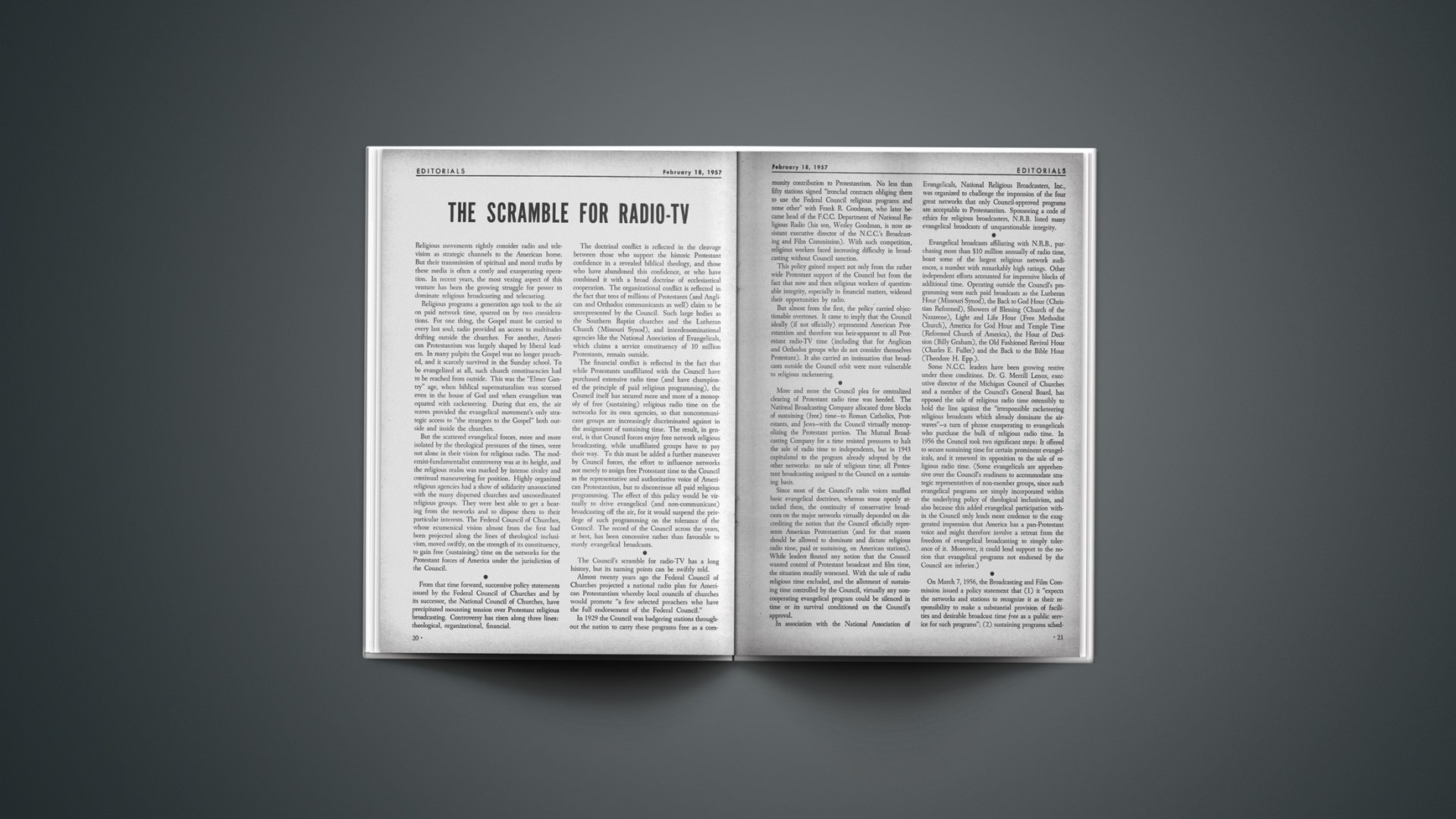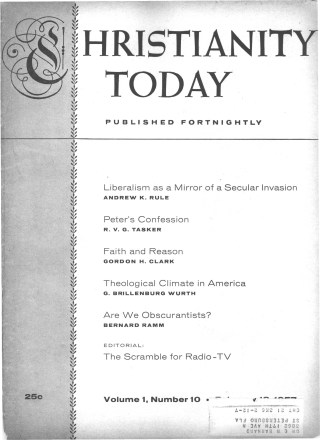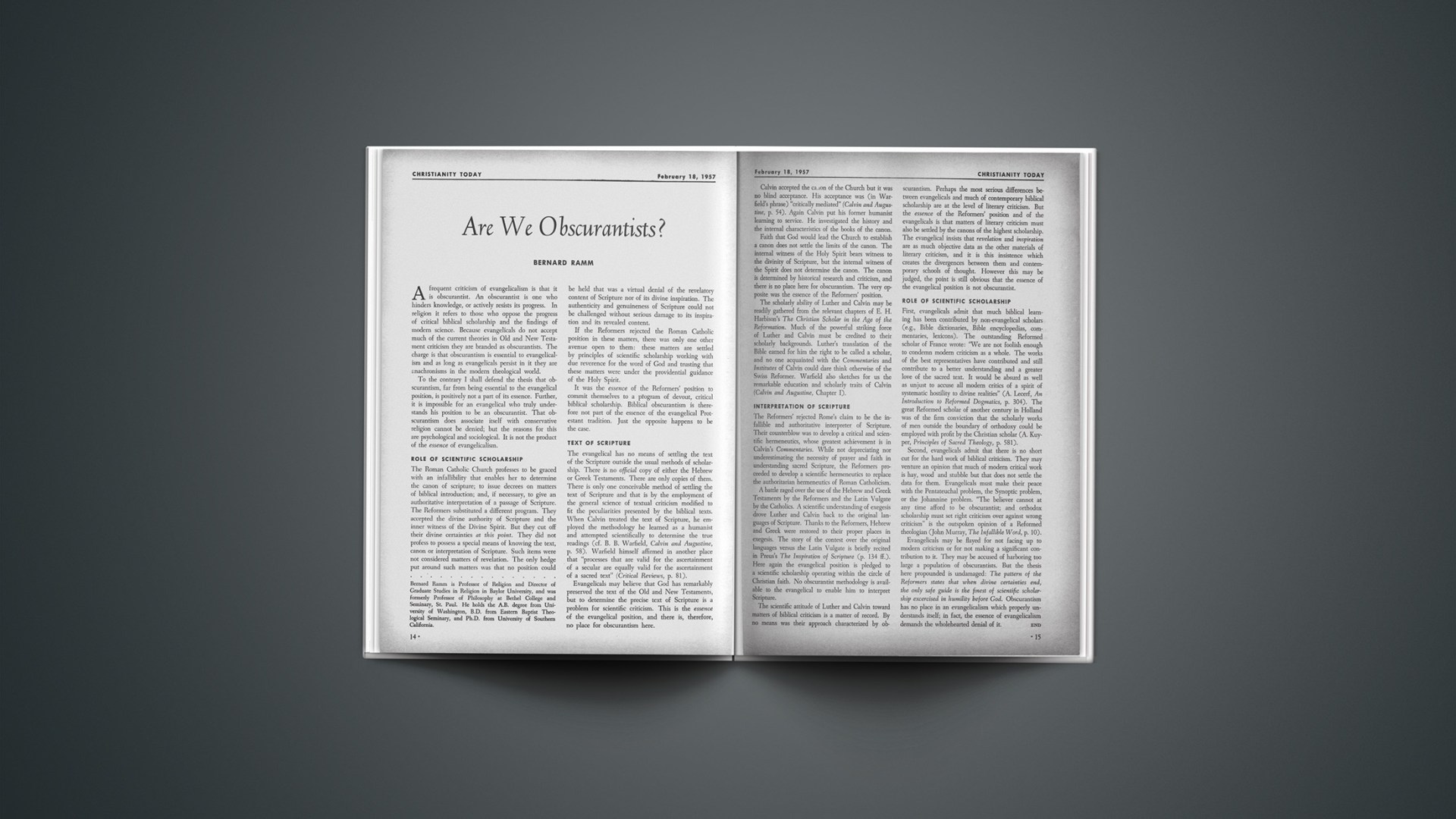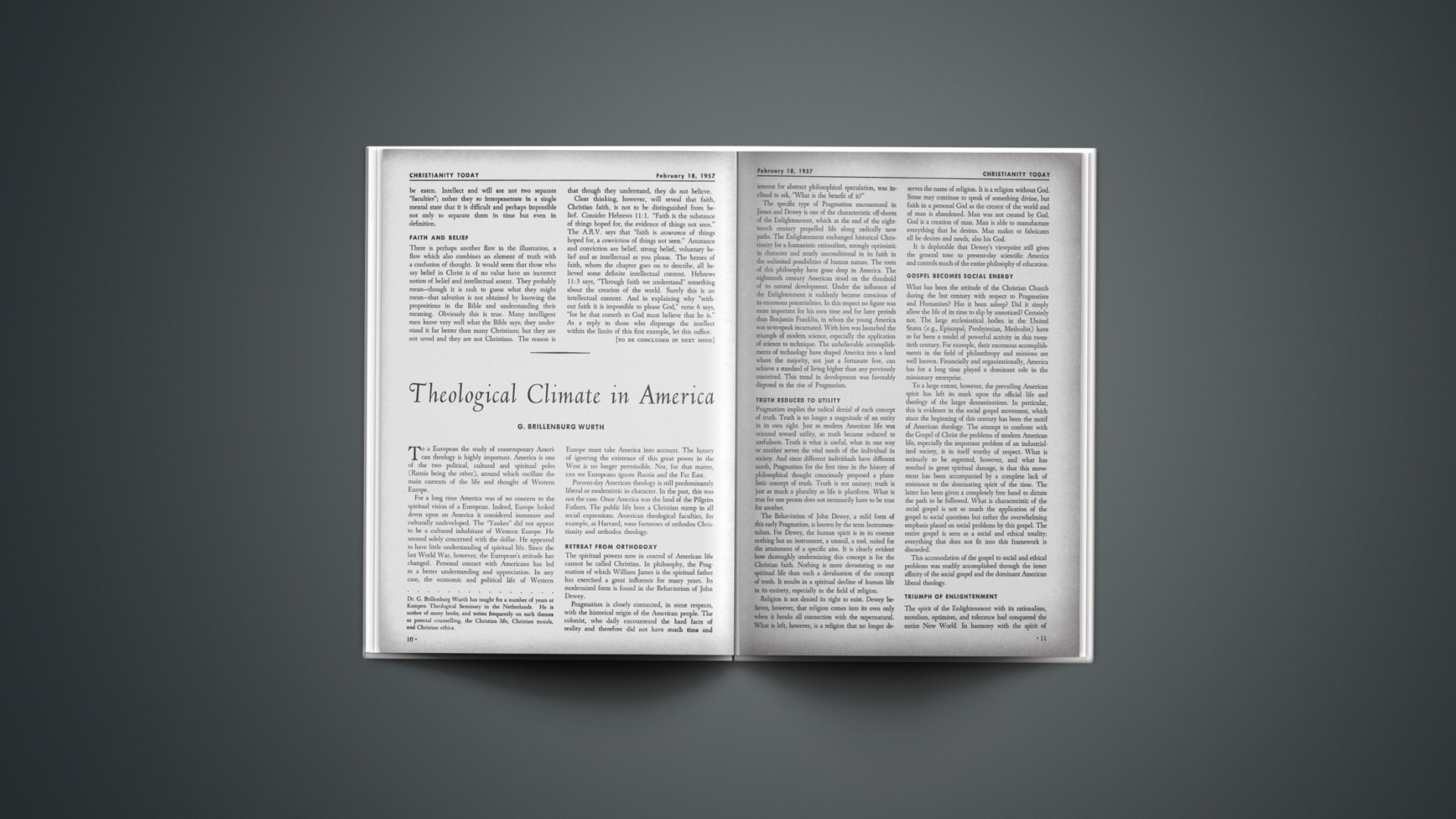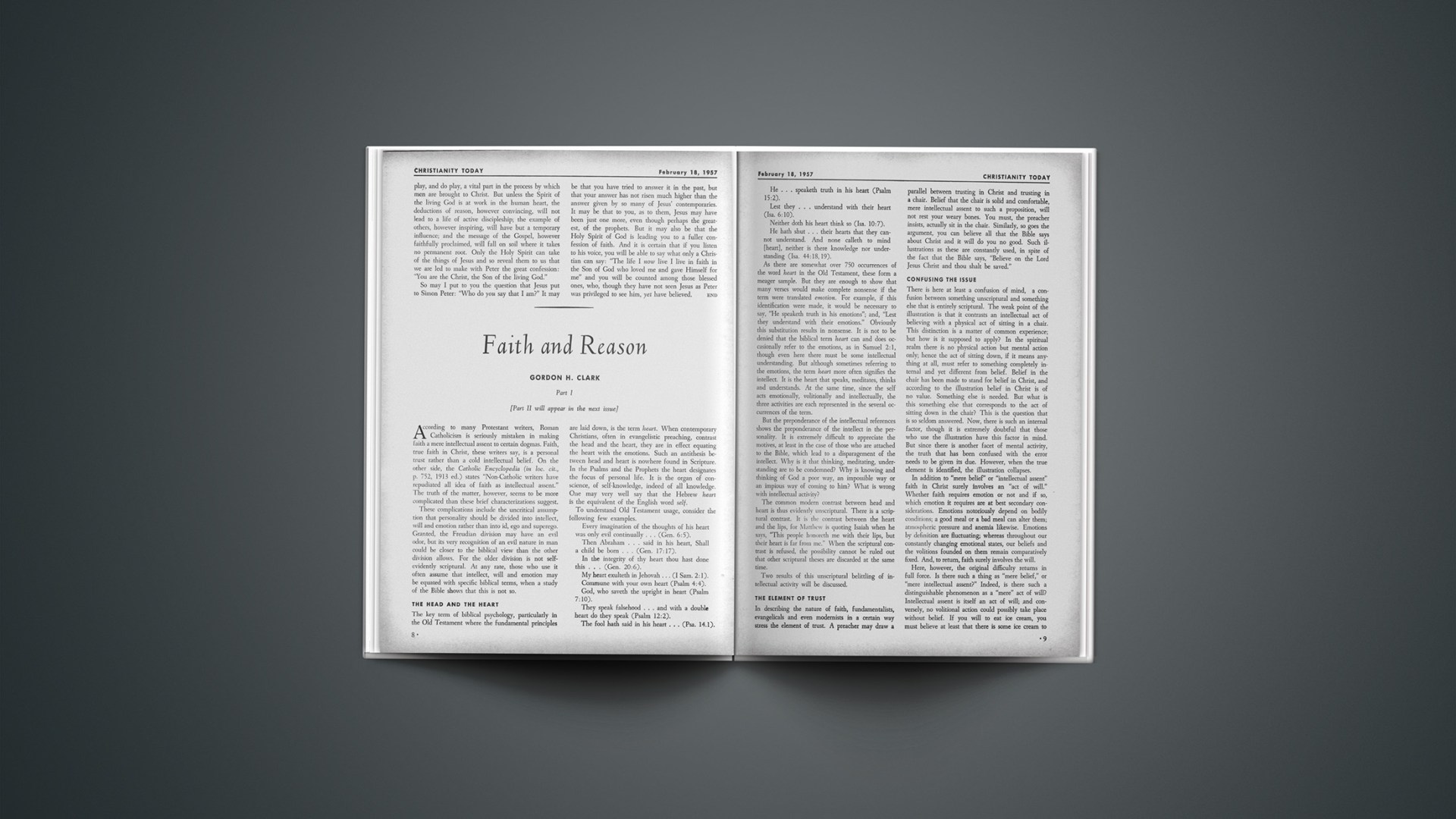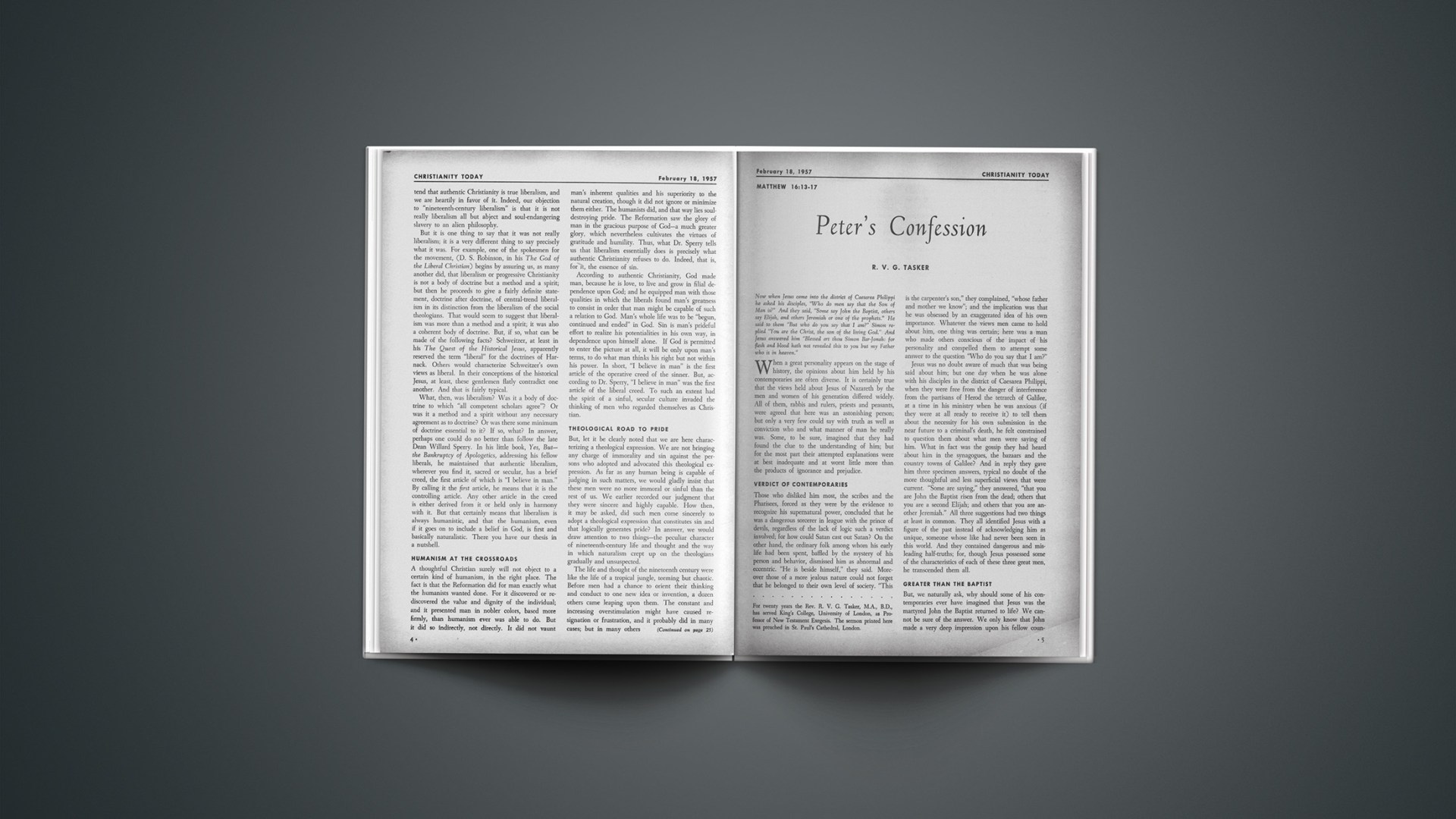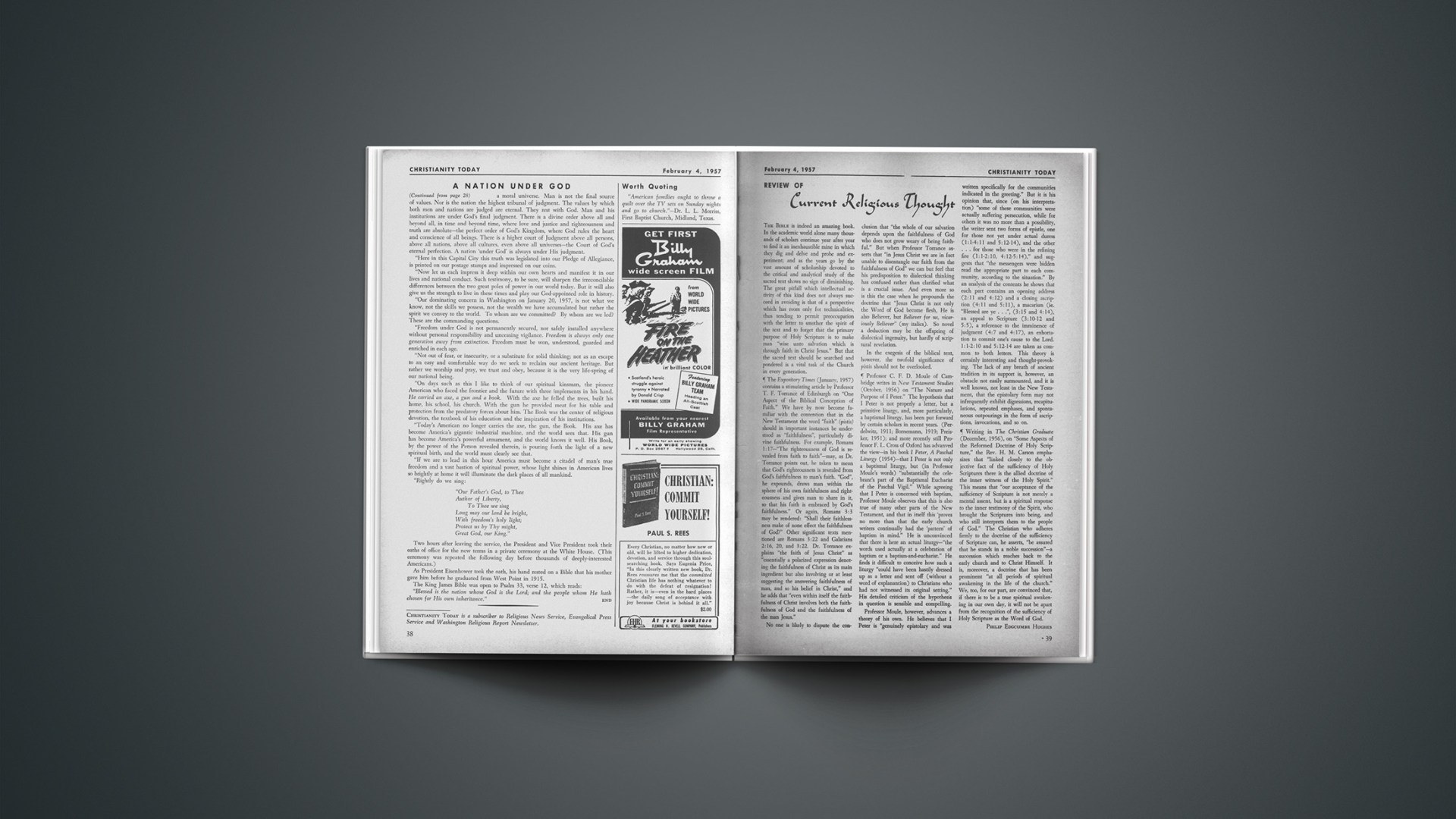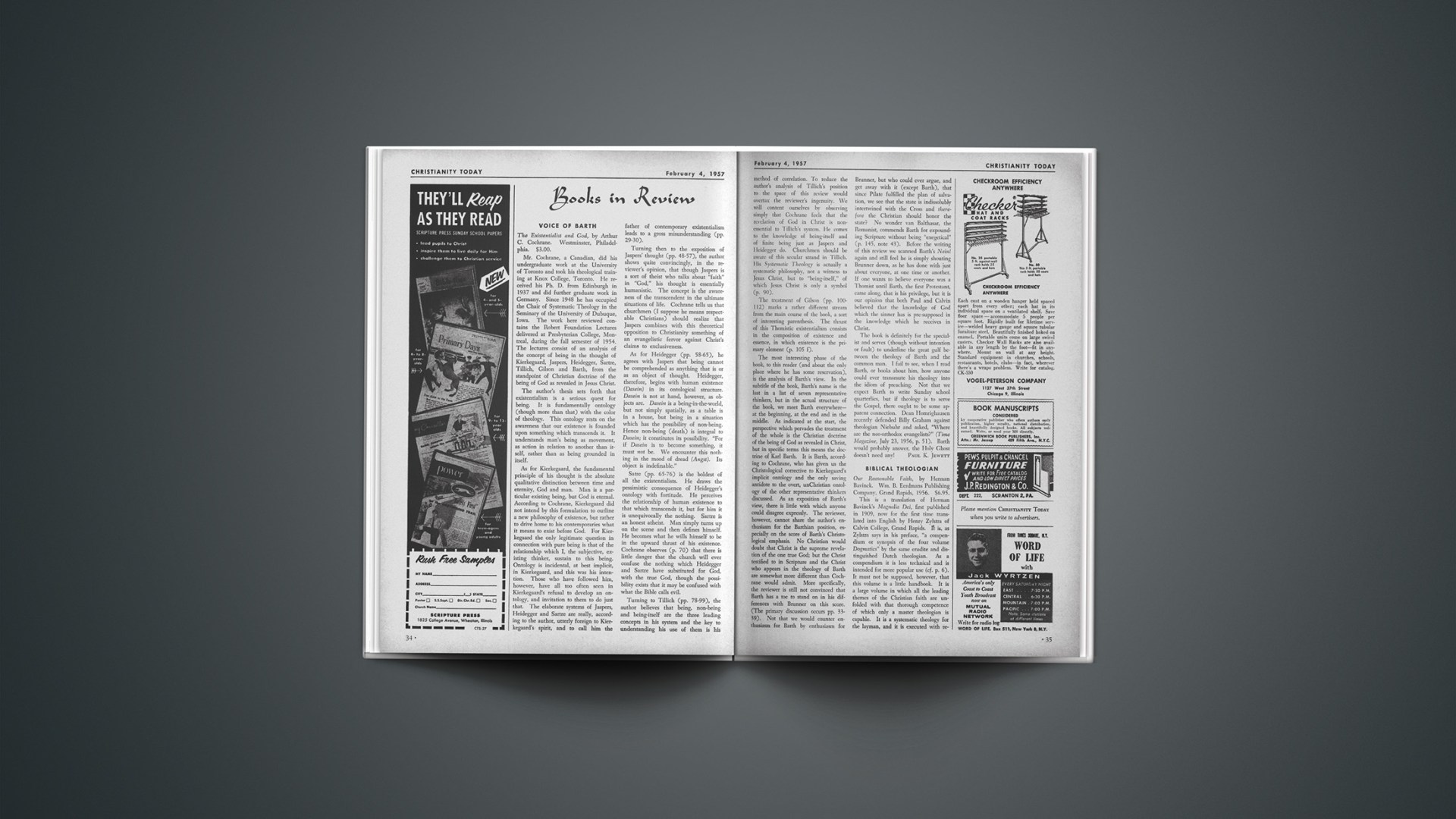Religious movements rightly consider radio and television as strategic channels to the American home. But their transmission of spiritual and moral truths by these media is often a costly and exasperating operation. In recent years, the most vexing aspect of this venture has been the growing struggle for power to dominate religious broadcasting and telecasting.
Religious programs a generation ago took to the air on paid network time, spurred on by two considerations. For one thing, the Gospel must be carried to every last soul; radio provided an access to multitudes drifting outside the churches. For another, American Protestantism was largely shaped by liberal leaders. In many pulpits the Gospel was no longer preached, and it scarcely survived in the Sunday school. To be evangelized at all, such church constituencies had to be reached from outside. This was the “Elmer Gantry” age, when biblical supernaturalism was scorned even in the house of God and when evangelism was equated with racketeering. During that era, the air waves provided the evangelical movement’s only strategic access to “the strangers to the Gospel” both outside and inside the churches.
But the scattered evangelical forces, more and more isolated by the theological pressures of the times, were not alone in their vision for religious radio. The modernist-fundamentalist controversy was at its height, and the religious realm was marked by intense rivalry and continual maneuvering for position. Highly organized religious agencies had a show of solidarity unassociated with the many dispersed churches and uncoordinated religious groups. They were best able to get a hearing from the neworks and to dispose them to their particular interests. The Federal Council of Churches, whose ecumenical vision almost from the first had been projected along the lines of theological inclusivism, moved swiftly, on the strength of its constituency, to gain free (sustaining) time on the networks for the Protestant forces of America under the jurisdiction of the Council.
From that time forward, successive policy statements issued by the Federal Council of Churches and by its successor, the National Council of Churches, have precipitated mounting tension over Protestant religious broadcasting. Controversy has risen along three lines: theological, organizational, financial.
The doctrinal conflict is reflected in the cleavage between those who support the historic Protestant confidence in a revealed biblical theology, and those who have abandoned this confidence, or who have combined it with a broad doctrine of ecclesiastical cooperation. The organizational conflict is reflected in the fact that tens of millions of Protestants (and Anglican and Orthodox communicants as well) claim to be unrepresented by the Council. Such large bodies as the Southern Baptist churches and the Lutheran Church (Missouri Synod), and interdenominational agencies like the National Association of Evangelicals, which claims a service constituency of 10 million Protestants, remain outside.
The financial conflict is reflected in the fact that while Protestants unaffiliated with the Council have purchased extensive radio time (and have championed the principle of paid religious programming), the Council itself has secured more and more of a monopoly of free (sustaining) religious radio time on the networks for its own agencies, so that noncommunicant groups are increasingly discriminated against in the assignment of sustaining time. The result, in general, is that Council forces enjoy free network religious broadcasting, while unaffiliated groups have to pay their way. To this must be added a further maneuver by Council forces, the effort to influence networks not merely to assign free Protestant time to the Council as the representative and authoritative voice of American Protestantism, but to discontinue all paid religious programming. The effect of this policy would be virtually to drive evangelical (and non-communicant) broadcasting off the air, for it would suspend the privilege of such programming on the tolerance of the Council. The record of the Council across the years, at best, has been concessive rather than favorable to sturdy evangelical broadcasts.
The Council’s scramble for radio-TV has a long history, but its turning points can be swiftly told.
Almost twenty years ago the Federal Council of Churches projected a national radio plan for American Protestantism whereby local councils of churches would promote “a few selected preachers who have the full endorsement of the Federal Council.”
In 1929 the Council was badgering stations throughout the nation to carry these programs free as a community contribution to Protestantism. No less than fifty stations signed “ironclad contracts obliging them to use the Federal Council religious programs and none other” with Frank R. Goodman, who later became head of the F.C.C. Department of National Religious Radio (his son, Wesley Goodman, is now assistant executive director of the N.C.C.’s Broadcasting and Film Commission). With such competition, religious workers faced increasing difficulty in broadcasting without Council sanction.
This policy gained respect not only from the rather wide Protestant support of the Council but from the fact that now and then religious workers of questionable integrity, especially in financial matters, widened their opportunities by radio.
But almost from the first, the policy carried objectionable overtones. It came to imply that the Council ideally (if not officially) represented American Protestantism and therefore was heir-apparent to all Protestant radio-TV time (including that for Anglican and Orthodox groups who do not consider themselves Protestant). It also carried an insinuation that broadcasts outside the Council orbit were more vulnerable to religious racketeering.
More and more the Council plea for centralized clearing of Protestant radio time was heeded. The National Broadcasting Company allocated three blocks of sustaining (free) time—to Roman Catholics, Protestants, and Jews—with the Council virtually monopolizing the Protestant portion. The Mutual Broadcasting Company for a time resisted pressures to halt the sale of radio time to independents, but in 1943 capitulated to the program already adopted by the other networks: no sale of religious time; all Protestant broadcasting assigned to the Council on a sustaining basis.
Since most of the Council’s radio voices muffled basic evangelical doctrines, whereas some openly attacked them, the continuity of conservative broadcasts on the major networks virtually depended on discrediting the notion that the Council officially represents American Protestantism (and for that reason should be allowed to dominate and dictate religious radio time, paid or sustaining, on American stations). While leaders flouted any notion that the Council wanted control of Protestant broadcast and film time, the situation steadily worsened. With the sale of radio religious time excluded, and the allotment of sustaining time controlled by the Council, virtually any non-cooperating evangelical program could be silenced in time or its survival conditioned on the Council’s approval.
In association with the National Association of Evangelicals, National Religious Broadcasters, Inc., was organized to challenge the impression of the four great networks that only Council-approved programs are acceptable to Protestantism. Sponsoring a code of ethics for religious broadcasters, N.R.B. listed many evangelical broadcasts of unquestionable integrity.
Evangelical broadcasts affiliating with N.R.B., purchasing more than $10 million annually of radio time, boast some of the largest religious network audiences, a number with remarkably high ratings. Other independent efforts accounted for impressive blocks of additional time. Operating outside the Council’s programming were such paid broadcasts as the Lutheran Hour (Missouri Synod), the Back to God Hour (Christian Reformed), Showers of Blessing (Church of the Nazarene), Light and Life Hour (Free Methodist Church), America for God Hour and Temple Time (Reformed Church of America), the Hour of Decision (Billy Graham), the Old Fashioned Revival Hour (Charles E. Fuller) and the Back to the Bible Hour (Theodore H. Epp.).
Some N.C.C. leaders have been growing restive under these conditions. Dr. G. Merrill Lenox, executive director of the Michigan Council of Churches and a member of the Council’s General Board, has opposed the sale of religious radio time ostensibly to hold the line against the “irresponsible racketeering religious broadcasts which already dominate the airwaves”—a turn of phrase exasperating to evangelicals who purchase the bulk of religious radio time. In 1956 the Council took two significant steps: It offered to secure sustaining time for certain prominent evangelicals, and it renewed its opposition to the sale of religious radio time. (Some evangelicals are apprehensive over the Council’s readiness to accommodate strategic representatives of non-member groups, since such evangelical programs are simply incorporated within the underlying policy of theological inclusivism, and also because this added evangelical participation within the Council only lends more credence to the exaggerated impression that America has a pan-Protestant voice and might therefore involve a retreat from the freedom of evangelical broadcasting to simply tolerance of it. Moreover, it could lend support to the notion that evangelical programs not endorsed by the Council are inferior.)
On March 7, 1956, the Broadcasting and Film Commission issued a policy statement that (1) it “expects the networks and stations to recognize it as their responsibility to make a substantial provision of facilities and desirable broadcast time free as a public service for such programs”; (2) sustaining programs scheduled “only in marginal or unsalable time are not in the best public interest”; and (3) it “advises against the sale or purchase of time for radio broadcasts.” Thus the Commission continued to append the demand for free time for all religious broadcasting to widening Council expectations, and dealt an indirect blow to evangelical broadcasters who rely on the purchase of network time.
The N.R.B. in a counterstatement on April 12 commended the American and Mutual networks, and many independent radio and TV stations as well, for allocating commercial time for paid Gospel broadcasts. It noted again that many millions of members of Protestant churches in the U.S.A. are unaffiliated with the Council and stressed that the National Association of Evangelicals, composed of forty denominations, supports paid broadcasting and telecasting opportunities. Repercussions in the industry followed swiftly. The National Broadcasting Company, long opposed to the sale of network religious time, reversed policy by signing contracts with “The Hour of Decision” and “The Lutheran Hour.”
Behind the Council’s push for the lion’s share of religious time lurks the notion that the Council is the authoritative corporate body for American Protestantism, and that the Council’s corporate witness is more truly ordained of God, or at least more deserving of priority, than either the individual ecumenical witness or the witness of nonaffiliates. For many years, the crescendo of complaint against the growing domination of Protestant radio-TV by Council forces was dismissed as the reactionary activity of malcontents and independents. In recent years, however, the solidity of the Council’s position has steadily deteriorated. When the N.R.B. held its fourteenth annual convention January 30–31 in Washington, D.C., the top echelon of the radio and television industry saw clearly that the National Association of Evangelicals was not alone in its protest against Council policy. In fact, the Council’s position was assailed from the right and from the left, by denominational and by interdenominational forces, and by elements inside as well as elements outside the Council. Dissociating themselves from the Council’s radio-TV policy, along with the N.R.B. and the National Association of Evangelicals, are representatives of the Southern Baptist churches, the Lutheran Church (Missouri Synod), the Anglican (or Anglo-Catholic, as distinguished from the Protestant Episcopal) communion and the United Lutheran Church. This wave of protest, carried directly to leaders in industry and government, weakens the Council’s claim to be the authoritative and accepted voice of American Protestantism and, in fact, is likely to force a revision of Council policy at the annual Board of Managers meeting March 4–6.
The most unfortunate side of the Council policy involves its intrusion into the radio-television opportunities of nonmember churches whose number is legion. Authoritative statistics to validate any claim that Council forces already get an excessive share of free Protestant radio time are hard to compile. Richard M. Allerton, research director for N.A.R.T.B. points out that accurate estimates would require a factual survey not only of network time, but of local programming on network stations during non-network time and also of programs on unaffiliated independent stations. Council forces are allied and active in pursuit of free time, nationally and locally. There is every reason to think—although from a business point of view this is strange—that the champions of free time as a public service to religion get more of it than those who champion paid religious time, and who may, in fact, be deprived of proportionate free time to which they would be entitled. Numerically speaking, the Council would seem to be entitled at the very most to about 63 per cent of available free radio time; the last religious survey lists 58,448,000 Protestants in the United States, while the Council—apart from the question of effective representation—claims a constituency of 36,719,000.
When the Broadcasting and Film Commission was criticized for manipulating to restrict radio-TV time-free and paid—available to nonmember evangelical agencies, one Council leader curiously rejoined: “We did not ask this just for ourselves.…” The Commission, however, had no mandate to speak for non-Council forces. What non-Council forces, it might be asked, desired an end of paid broadcasts? Or the expansion of free time for Council programming? The obvious reply to such questions doubtless explains an additional comment, equally unconvincing: “[We did not ask this just for ourselves] though we did not presume to speak for anyone other than ourselves.” Yet radio-TV stations not only caught the impression that Council member churches are repudiating paid religious time, but they felt encouraged to discontinue paid religious time to nonmember evangelicals, the main supporters of paid religious time.
One of the big imperatives is that the basic errors of the past generation be frankly confessed by church leaders involved in the scramble for radio-TV time, and that program assignments be encouraged with an eye to fairness to the respective constituencies. The time, energy and money now spent in religious controversy and maneuvering could be used constructively to improve programming if an agreement were reached for fair radio-TV allotments. Liberal theology has every right to be represented on the air, but the evangelical forces have an equal right. Where necessary, they are prepared to pay for it. That the more liberal churchmen should insist upon free time for themselves while denying others the right to buy time is a sad commentary on both Americanism and the freedoms on which our land was founded.
Opposition To Evangelism A Strange Phenomenon
Billy Graham’s coming campaign in New York City is more than just another evangelistic effort in a city where the Gospel of Jesus Christ is needed so desperately, where only a small minority give lip service to Christianity, where the majority have no church connections whatsoever and where paganism is entrenched as strongly as almost anywhere in the world.
All of these factors are present but the battleground has cast upon it a strange light of conflict precipitated by and participated in by two extremes within the Church.
There are two forces which for opposing motives are working, intentionally or not, to destroy the effectiveness of this campaign. The extreme liberals are throwing up road blocks of criticism, disparagement and contempt. The extreme fundamentalists are doing exactly the same.
An analysis of this situation is now due for it is highlighting unbelief on one hand and devisiveness on the other. It is showing up the philosophy of a religion which will countenance the rejection of many of the cardinal doctrines of the Christian faith and belittle those who preach them. It is also making plain for all to see the unjustifiably narrow and pharisaical concept of Christianity held by some extremists who improperly take refuge in the fundamentalist’s camp.
That both of these positions should be so clearly defined by these controversies is fortunate. It will cause Christians to think. It should also lead us to fervent prayer.
By the extreme liberals Mr. Graham is being attacked for what he preaches.
By the extreme fundamentalists he is being attacked because of some of those who share in making this preaching possible.
One of the New York’s leading secular journalists remarked to the writer: “They are scared to death because if this campaign is a success and Billy Graham is right in his message, they are discredited. Either they will have to admit they are wrong or continue to live a lie.”
The extreme fundamentalists bitterly attack Mr. Graham, not because of the content of his message so much as because they do not like some of the company he keeps. Also, they insist that instead of channeling converts “into the church of their choice,” they should be sent “only to fundamentalist churches.” But even here they often disagree among themselves as to what constitutes an acceptable church. They would narrow this in many cases to churches where controversy and bigotry are rampant. That the campaign itself would be made impossible by their own concept of the Gospel is no deterrent.
In writing this we are in no way suggesting that Mr. Graham has not made mistakes. He has made them and will probably make more. Few men have not been guilty of making hasty statements which if later given the opportunity they would gladly retract. Furthermore, any person in the public eye as much as Mr. Graham is subjected to situations where a misquotation or amisinterpretation is inevitable. But an evaluation of the projected New York campaign should be based on the positive aspects involved in motive and message.
What is Mr. Graham’s objective? We are not speaking for him personally. But on the basis of his work in recent years—in Houston, London, Glasgow, on the Continent of Europe, in Oklahoma City, Louisville, at Cambridge, Oxford and at Yale—certain facts are clear.
What is Mr. Graham trying to do? Very obviously he is trying to preach the Gospel of Jesus Christ in all of its fullness to all who will hear it, praying that the Holy Spirit will take the message and use it to win souls to him and then guide and protect and instruct and strengthen them as they go on in the Christian life.
If extreme liberals will cooperate in such meetings, listening to the message and urging others to hear them, Mr. Graham praises God for this opportunity. If extreme fundamentalists do the same he is equally thankful. In a unique way we believe God has laid his hand on Mr. Graham for this particular and specific purpose. In it he is also following the example of the Lord Jesus Christ who preached to all who would hear (and whose strongest denunciations were often against those who would restrain men and close the door of heaven in their faces).
By the admission of many of its former adherents extreme liberalism has no saving Gospel. It has found itself discredited not only by the lack of content of its message but also by the distortions of its program. At the same time, extreme fundamentalism discredits the Gospel it affirms by an extreme and dubious doctrine of so-called “second degree separation” on the one hand, and the virtual absence of the first principle of the fruits of the Gospel—Christian love—on the other.
That these two forces should now have unwittingly, but none the less truly, joined hands to hinder the preaching of the simple Gospel of God’s redeeming love—which in Mr. Graham’s preaching includes Christ’s incarnation, his ministry, his atoning and substitutionary death, his bodily resurrection and his coming again; along with the personal obligation of believers to make him not only Savior from sin but also the Lord of life—that such opposition has now arisen, is a judgment on both camps.
What progress has been made in establishing a committee in New York which is representative of Protestant forces? Great progress has been made. Men of good will from both camps have recognized the need for a great spiritual awakening in New York. They have admitted that Protestant Christianity by any token is a pitifully weak force there. They unite in recognizing that Christ alone can bring about a change and they unite in believing that such a campaign offers the greatest hope of making an impact for Christ where that impact is so greatly needed.
Because of this common conviction a large group of men have united to make the Madison Square Garden Campaign a reality. The Garden has been leased for every night for five months, should there be evidence that the campaign should continue that long. They have prayerfully agreed that their own differing viewpoints should be submerged in a united effort to make Christianity a reality in the hearts and lives of men who now know Him not.
There have been problems but they have been resolved in Christian love. Other problems will certainly arise. But God has marvellously touched the hearts of these men and given them a vision of reaching that city. That they have united in asking as the man to lead this crusade one on whose ministry there rests to such a marked degree the seal of God’s blessing, should be a reason for thankfulness for Christians everywhere and should at the same time cause such an outpouring of prayer for the campaign that the very gates of hell itself will be shaken.
In many ways the New York campaign is a clarifying challenge to Christians. Involved are many things but the two outstanding factors are these: what is the Christian message?, under what conditions should the Gospel be preached?
Mr. Graham will unhestitatingly preach the biblical message, not only in its full doctrinal content but also in its social application. He will also unhesitatingly associate with and preach to all who are willing to hear that message. That he has been and will continue to be the target of attack by extremists in both camps within the Church should make him and his attackers the object of the prayers of all of us.
Mr. Graham needs wisdom, courage, physical and spiritual strength in a degree which can come alone from the outpouring of God’s Holy Spirit in the fullest measure. Those within the Church who are now doing everything within their power to damage and destroy these meetings need a sober re-evaluation of their own position. They need an outpouring of God’s spirit which will make them join in prayer that despite their misapprehensions God’s name shall be glorified and countless souls won to Jesus Christ.
If the New York campaign is of God, and with all our heart we believe it is, then all who name the name of Christ should unite in prayer for it—prayer that mistakes may be overruled, that wisdom and strength may be given to all who are now carrying the burden and that men and women and young people who are now without Christ and without hope in the world may hear the Gospel and believe it to their eternal salvation.
A Call For Renaissance Of Evangelical Literature
Dr. Frank E. Gaebelein calls for a renaissance of worthy evangelical literature. He claims that Christian writers are far from producing great and distinctive works. Lack of rigid Bible study, absence of proper Christian education and aesthetic appreciation, deficiency of hard work contribute to the dearth and poverty of evangelical literature. An additional reason has been the concentration on negative criticism. The surge of liberal scholarship resulted in evangelical preoccupation with an exhibition of liberal weaknesses. Meanwhile the positive presentation of biblical Christianity has been spotty and sporadic.
Evangelical theologians and writers have overlooked the strategic advantage of a positive presentation of biblical doctrines, biblical theology and an output of scholarly commentaries. Such work, displaying the wonderful unity of the Scriptures, would have the effect of placing liberal scholarship on the defensive. Furthermore, it would encourage and inspire the evangelical pulpit to a more positive and powerful presentation of the Gospel. While some progress has been made, the great need of the day is for evangelical writers to present the glorious truths of the Scriptures.

